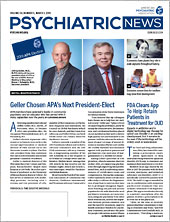APA has signed onto an amicus brief in support of a suit against the federal government for approval of a Kentucky state policy that makes Medicaid coverage dependent on employment.
APA joined six other groups in support of a group of Medicaid patients suing Health and Human Services Secretary Alex Azar for the Trump administration’s approval of a waiver for Kentucky Health, a state demonstration program that conditions coverage under the state’s Medicaid expansion on documenting 80 hours of employment a month.
The brief was filed in the U.S. District Court for the District of Columbia in the case Ronnie Maurice Stewart, et.al. v. Alex M. Azar II, et al. The other groups on the amicus are the American Academy of Pediatrics, American Medical Association, American College of Physicians, Catholic Health Association of the United States, March of Dimes, and National Alliance on Mental Illness.
The brief argues that the work requirement will cause thousands of Kentuckians to lose health coverage. “Kentucky’s new work requirements will not ‘improve the health of Medicaid beneficiaries,’ as HHS asserts,” the brief states. “It will deprive thousands of the neediest beneficiaries of their coverage and trigger an avalanche of negative health results. Many of the disenrolled will become sicker, and some could die prematurely.”
Kentucky originally implemented a traditional Medicaid expansion in January 2014 according to the terms set out in the Affordable Care Act. Gov. Matt Bevin was elected in December 2015 after campaigning on a platform to end the Medicaid expansion and dismantle the state-based marketplace. After the election, the governor sought a Section 1115 waiver to change the state’s traditional Medicaid expansion, and the waiver was approved in January last year.
The work requirements apply to all enrollees in Kentucky’s Medicaid program. Those who are exempt include pregnant women, one primary caregiver of a dependent minor child or adult who is disabled per household, people who are medically frail, people who are disabled under certain conditions, and full-time students.
Marvin Swartz, M.D., chair of APA’s Council on Psychiatry and Law, said many individuals eligible for Medicaid may be unable to work even if they have not been officially determined to be disabled by the Social Security Administration.
“There are clearly documented gains in health outcomes resulting from Medicaid insurance coverage that will be lost, and predictably health will decline,” he told Psychiatric News. “Such a work requirement is a considerable challenge for nondisabled individuals who have intellectual or mental health conditions that seriously interfere with the ability to work. They will very likely lose access to general and behavioral health care.”
The brief further states that by the state’s own estimates, the work requirement will lead to 1.14 million lost coverage months—the equivalent of nearly 100,000 people losing coverage for a year.
“That is because most of Kentucky’s unemployed beneficiaries are not merely jobless; they are unable to work,” the brief states. “Even those who are actively looking for employment face serious issues in finding and keeping a job that will only be exacerbated by taking away their health care. And many Medicaid beneficiaries who have jobs do not work according to consistent schedules—making it difficult to meet Kentucky Health’s one-size-fits-all work requirements. HHS and Kentucky do not explain how these often-insurmountable barriers to entering the workforce and remaining employed will go away just because the Commonwealth has made employment a condition of eligibility for Medicaid coverage. To the contrary, many unemployed and underemployed beneficiaries will simply lose coverage.”
Swartz said that whatever the outcome in the district court, the case will likely be appealed and may go to the Supreme Court. ■
The brief can be accessed
here.

